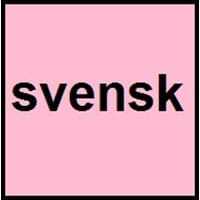Swedish vs Cantonese
Countries
European Union, Finland, Nordic Council, Sweden
Hong Kong, Macau
National Language
Sweden
China, Guangdong
Second Language
Finland
Not spoken in any of the countries
Speaking Continents
Antartica, Europe
Asia
Minority Language
Australia, Belgium, Canada, France, Germany, Netherlands, Spain, Switzerland, United Kingdom, United States of America
Hawaii
Regulated By
Institute for the Languages of Finland, Swedish Academy, Swedish Language Council
Civil Service Bureau, Government of Hong Kong, Official Language Division
Interesting Facts
- In Swedish language, article comes after noun.
- Most of the words in Swedish language began "S" than any other letter.
- Cantonese have lot of slangs, many of them include words that do not make sense at all and some also have English in them.
- Even though Cantonese and Mandarin are dialects of Chinese, Cantonese has 8 tones instead of Mandarin's 4.
Similar To
Norwegian and Danish Language
Chinese Language
Derived From
Old Norse Language
Not Available
Alphabets in
Swedish-Aphabets.jpg#200
Cantonese-Alphabets.jpg#200
Scripts
Latin
Chinese Characters and derivatives
Writing Direction
Left-To-Right, Horizontal
Left-To-Right, Horizontal, Top-To-Bottom
How Are You?
hur mår du
你好吗?
Good Evening
god kväll
晚上好
Good Afternoon
god eftermiddag
下午好
Good Morning
god morgon
早上好
I Love You
jag älskar dig
我爱你
Excuse Me
ursäkta mig
原谅我
Dialect 1
Dialects
Guangzhou
Where They Speak
Gabon
outside mainland China
How Many People Speak
Not Available
Dialect 2
Dialects
Xiguan
Where They Speak
Georgia
Hong Kong
How Many People Speak
Not Available
Dialect 3
Dialects
Hong Kong
Where They Speak
France
Hong Kong
How Many People Speak
Not Available
Second Language Speakers
Not Available
Native Name
Svenska
Kwang Tung Wa
Alternative Names
Ruotsi, Svenska
Guangfu, Metropolitan Cantonese
French Name
suédois
Not Available
German Name
Schwedisch
Not Available
Pronunciation
[ˈsvɛ̂nskâ]
Not Available
Ethnicity
Swedes, Finland Swedes
Not Available
Origin
13th Century
17th century
Language Family
Indo-European Family
Sino-Tibetan Family
Subgroup
Germanic
Not Available
Branch
Northern (Scandinavian)
Not Available
Early Forms
Old Swedish
No early forms
Standard Forms
Standard Swedish
Standard Cantonese
Language Position
Not Available
Signed Forms
Tecknad svenska, ("Signed Swedish")
Not Available
Scope
Individual
Not Available
ISO 639 1
sv
No data available
ISO 639 2/T
swe
Not Available
ISO 639 2/B
swe
Not Available
ISO 639 3
swe
No data available
ISO 639 6
Not Available
Not Available
Glottocode
swed1254
cant1236
Linguasphere
52-AAA-ck to -cw
No data available
Language Type
Living
Not Available
Language Linguistic Typology
Subject-Verb-Object
Not Available
Language Morphological Typology
Not Available
Not Available
Swedish and Cantonese Language History
Comparison of Swedish vs Cantonese language history gives us differences between origin of Swedish and Cantonese language. History of Swedish language states that this language originated in 13th Century whereas history of Cantonese language states that this language originated in 17th century. Family of the language also forms a part of history of that language. More on language families of these languages can be found out on Swedish and Cantonese Language History.
Swedish and Cantonese Greetings
People around the world use different languages to interact with each other. Even if we cannot communicate fluently in any language, it will always be beneficial to know about some of the common greetings or phrases from that language. This is where Swedish and Cantonese greetings helps you to understand basic phrases in Swedish and Cantonese language. Swedish word for "Hello" is hej or Cantonese word for "Thank You" is 谢谢. Find more of such common Swedish Greetings and Cantonese Greetings. These greetings will help you to be more confident when conversing with natives that speak these languages.
Swedish vs Cantonese Difficulty
The Swedish vs Cantonese difficulty level basically depends on the number of Swedish Alphabets and Cantonese Alphabets. Also the number of vowels and consonants in the language plays an important role in deciding the difficulty level of that language. The important points to be considered when we compare Swedish and Cantonese are the origin, speaking countries, language family, different greetings, speaking population of these languages. Want to know in Swedish and Cantonese, which language is harder to learn? Time required to learn Swedish is 24 weeks while to learn Cantonese time required is 88 weeks.





